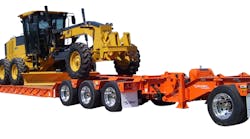Talbert Manufacturing strongly supports proper preventive maintenance (PM) programs that include tiered planning for scheduled service, says Troy Geisler, vice president of sales and marketing for Talbert Manufacturing. Through such programs, vehicles are inspected, repaired and maintained so that defects can be prevented, and this helps avoid violations or accidents.
The company (www.talbertmfg.com) builds a wide variety of heavy haul trailers and specialized transportation equipment. Its product line includes tag-a-long, utility, tilt deck, hydraulic slide axle/hydraulic tail, stepdeck, lowbed, extendible, east/west spread axle and multi-axle configuration trailers.
Reactionary maintenance programs, on the other hand, are based on problems, and involve fixing something that has failed, he says. These types of programs result in excessive vehicle downtime and the resulting costs of idle equipment.
The difference between preventive and reactive maintenance will not only affect a fleet’s bottom line, but it could prevent time-consuming and expensive failures on the road, he adds. Effective preventive maintenance programs have proven successful, leading to safer transport while saving both time and money.
In addition to preventive maintenance, Talbert Manufacturing recommends that owners have an intimate knowledge of their equipment, as well as know beforehand how various configurations will change vehicle functionality and performance.
This is especially true with heavy haul trailers, as adding a jeep, gooseneck extension, deck types, deck extension, additional axles and/or axle extensions will affect how the load handles, notes Geisler. Oftentimes, components sit until they are required, so be sure to list and include these in the preventive maintenance program.
“Prior proper planning will prevent poor vehicle performance,” he concludes.




